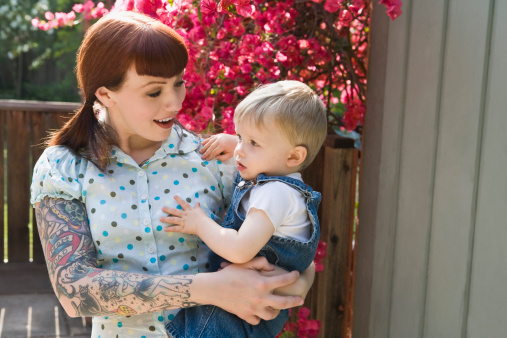This originally appeared on Laura Farhy’s blog. Republished here with permission.
I find myself worrying constantly about being judged poorly as a mother. If a kid is alive, healthy, and happy—shouldn’t that be enough?
I take my son to this nearby park; and regardless of how many times we go, there always seems to be a new assortment of moms there.
Some of the mothers are extremely attentive to their children, and some of the mothers sit in the shade and watch their kids play. Some of the mothers are on their phones, and some of the mothers barely pull their phones out of their pocket.
Based on these observations, if I were to ask you which moms are “good” moms, and which moms are “bad” moms—you would be able to toss the discussed moms into categories based on your expectations of “perfect mom” behavior.
This is puzzling to me, that we are able to categorize so quickly, because the characteristics of a good mom are as abstract as what makes a person happy or what makes a woman beautiful.
A snapshot in time of a mother’s behavior is not an accurate representation of her competency overall. And yet, society judges mothers constantly based on theoretical criteria. As far as I am concerned, it just seems like one more imaginary standard a woman is held accountable to.
For example, if a woman is career driven, and spends very little time with her children, society sees her as a questionable mom. If a mother puts her child in front of a TV for a minute longer than is medically allowed to, she is a questionable mom. If a mother has tattoos and piercings all over her body, she is a questionable mom.
It doesn’t stop there. Moms do it to each other. Moms who breastfeed are “better” moms than moms who don’t. Moms who feed their kids all organic food are “better” moms than the moms who don’t. And the ever famous, moms who had natural births are “better” than moms who didn’t.
Then there is the “first of” competition: Whose kid is walking first, talking first, and sleeping through the night first. It’s exhausting. All these firsts are an unspoken reflection of a mother’s parenting skills.
It seems like everyone has an opinion on how to raise a child. Which makes sense, considering we live in a world where there are as many ways to raise a child as there are ways to lose weight.
Is it because society as a whole crusades for the safety and welfare of children? If so, where do we draw the line between safety and scrutiny?
When does letting your child eat sugar for breakfast become as punitive as a child never getting breakfast? If those acts are not greater than or equal to, does that mean moms should be rated like earthquakes on a Richter scale?
The point is I find myself worrying constantly about being judged poorly as a mother. Which is ironic considering the expression “mother knows best” exists for a reason. Because a mother knows what is best for her child.
Every child needs a different type of mom—which is why there is no blanket “perfect mom” formula, much like there is no blanket “perfect kid” formula. Children are like Rubik’s cubes. Each child requires a different twist and turn to complete the puzzle. At the end of the day, each parent is doing the best they can.
Raising a kid is like walking down the stairs in the dark—you just have to feel your way through it, and hope that you don’t fail miserably. So perhaps we should lower the bar on this perfect mom business. If a kid is alive, healthy, and happy—shouldn’t that be enough?
Laura Farhy left a promising career at a full-time job to became a stay at home mom, and to finally pursue her dream of becoming a published writer and author. Her blog, “A Stay At Home Blog” (astayathomeblog.com), chronicles her thoughts on motherhood, life, and her journey into the publishing industry. She lives in Atlanta with her husband, four furry babies, and her son Kasen.
Related Links:

